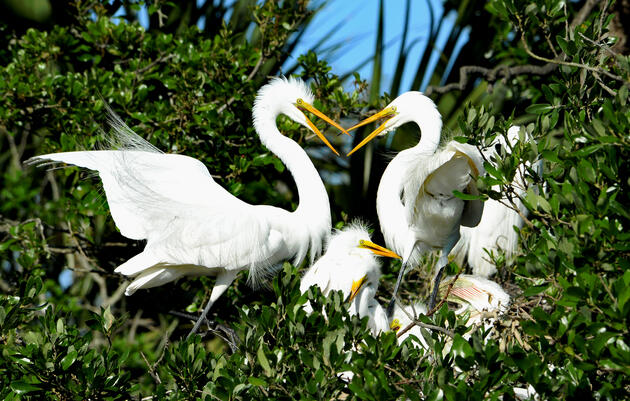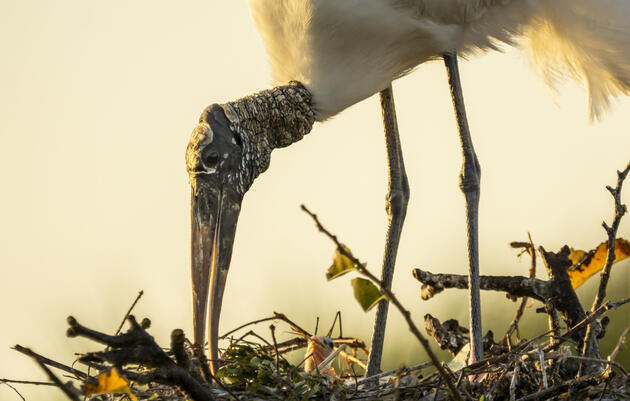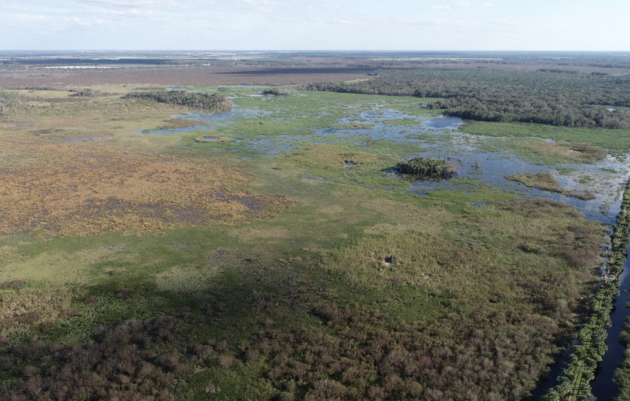Wood Stork
One of Florida's most iconic wading birds, Wood Storks have suffered from the destruction and degradation of our state’s wetlands. Today, the Wood Stork is classified as “Threatened” by the State of Florida and the federal government.
The Wood Stork feeds in shallow water, stirring the bottom with its unlikely pink feet and snapping up small prey that are unlucky enough to encounter the bird’s sensitive bill. They nest in early spring, just in time for the traditional season of lowest water when prey items will be concentrated in shrunken wetlands, providing good hunting so the storks can feed their young.
Now, we have altered the natural cycle of high and low water in our wetlands and Wood Storks often can’t find enough food for their young, who eventually succumb to starvation.
The federal government has proposed de-listing the Wood Stork completely. We do not support this action. The Greater Everglades Ecosystem used to be this species’ heartland, supporting massive colonies of this iconic wading bird. Today, the region’s megacolonies are a distant memory and in many seasons, chicks starve in their nests for lack of food due to loss and degradation of wetland habitat. While storks have recently spread northward, it’s unclear whether these outposts can survive long-term, especially with the loss of habitat protections that would accompany delisting and the uncertainties posed by climate change. Learn more here.
How Audubon Improves the Future for Wood Storks
- Everglades Restoration: The Everglades is a historical feeding and nesting ground for Wood Storks. By restoring the river of grass, we will ensure there will always be places for storks to feed, nest and raise their young.
- Lake Okeechobee Recovery: Wood Storks forage in and nest around this beleagured big lake. Cleaning up the lake will help storks and a suite of other animals, as well as the Everglades itself.
- Corkscrew Swamp Sanctuary: This Audubon Sanctuary in Southwest Florida protects one of the state’s largest Wood Stork rookeries. Audubon actively manages the Sanctuary for the storks’ benefit, and we advocate for their feeding grounds downstream. Click here to learn more about restoration efforts at the Sanctuary.
Related
In 2021, the Everglades Experienced its Second-highest Nesting Effort for Many Wading Bird Species in 80 Years
Are restoration and conservation efforts improving the health of the Everglades? The birds tell us.
Audubon Florida Disappointed that the USFWS Removes Wood Stork from Endangered Species Act Protection
by Julie Wraithmell, Executive Director, Audubon Florida
Corkscrew Swamp Sanctuary Celebrates 1,000 Acres of Restoration
We are grateful to our staff, partners, and donors who have made this milestone possible.
How you can help, right now
Donate to Audubon
Help secure the future for birds at risk from climate change, habitat loss and other threats. Your support will power our science, education, advocacy and on-the-ground conservation efforts.
Become a Monthly Donor
Donating monthly is flexible, easy and convenient and makes you a champion birds can count on, no matter the season.
Volunteers Needed
Florida's birds and wildlife need your time and energy. Learn how you can become a citizen scientist or a volunteer at one of our nature centers today.






